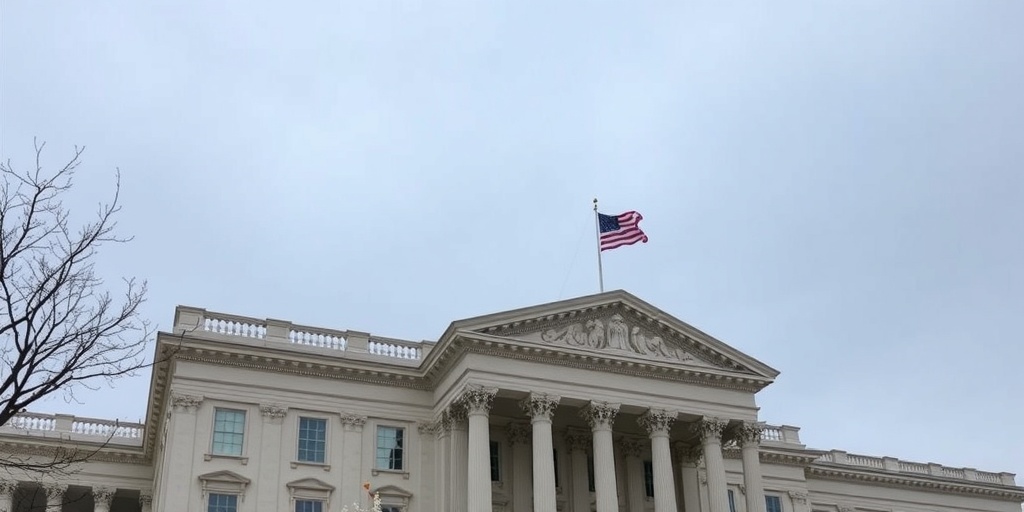Now Reading: Maine Sues USDA Over School Lunch Funding in Title IX Dispute
-
01
Maine Sues USDA Over School Lunch Funding in Title IX Dispute
Maine Sues USDA Over School Lunch Funding in Title IX Dispute

Maine Sues USDA Over Frozen School Meal Funding Amid Transgender Athlete Controversy
In a significant legal move, the State of Maine has initiated a lawsuit against the U.S. Department of Agriculture (USDA), claiming that the federal agency improperly froze funding designated for school meal programs. Filed in Federal District Court on Monday, the lawsuit asserts that this funding freeze poses a grave threat to the essential services that provide meals for schoolchildren across the state.
This legal battle marks a continuation of an escalating conflict between Maine and the Trump administration, primarily regarding the treatment and inclusion of transgender athletes in school sports. The dispute was ignited earlier this year when President Trump criticized Maine’s Governor, Janet Mills, during a meeting at the White House. This confrontation has led to repeated threats from Trump to penalize the state should it refuse to comply with his administration’s executive order, which seeks to restrict transgender women from competing on women’s sports teams.
The USDA has contended that Maine’s policies, which include a law that prohibits discrimination against transgender individuals and allows transgender athletes to participate in women’s sports, directly violate Title IX. This federal civil rights law bars discrimination on the basis of sex in educational programs and activities receiving federal financial assistance.
Brooke Rollins, the agriculture secretary at the time, communicated this stance in a letter to Governor Mills, stating, “You cannot openly violate federal law against discrimination in education and expect federal funding to continue unabated.” The letter further warned that Maine’s noncompliance could lead to more severe consequences in the future. Rollins emphasized that the state can rectify the situation at any time by aligning its policies with federal mandates meant to protect women’s and girls’ sports.
In the lawsuit, Maine’s Attorney General, Aaron Frey, argues that Title IX does not preclude transgender athletes from participating in women’s sports. He points out that various federal court rulings have affirmed that civil rights protections necessitate allowing such participation. This legal interpretation suggests that the federal government’s stance may be at odds with judicial precedent concerning the rights of transgender individuals in educational settings.
The funding in question is critical, as it supports the salaries of workers who oversee the statewide school meals program in Maine, as well as covering the costs associated with communication tools necessary for the program’s operation. The lawsuit emphasizes that the freeze on these funds puts the very existence of the school meal program at risk, potentially endangering the welfare of many children who depend on these nutritional services.
“This action by the Trump administration, under the guise of protecting children, is, in reality, an illegal withholding of critical grant funds essential for the feeding of children,” stated Attorney General Frey. He expressed determination to stand firm against federal pressure, declaring, “This action is necessary to remind the president that Maine will not be bullied into violating the law.”
The state is seeking an emergency court order to immediately restore the frozen funding, arguing that the halted resources are vital for maintaining the operation of school meal programs, which serve as a lifeline for many families in Maine. The implications of the case extend beyond financial considerations; they touch on broader issues surrounding civil rights, educational equity, and the ongoing struggle for the rights of transgender individuals.
As the lawsuit unfolds, it may set important precedents regarding the balance of state rights against federal authority, particularly in the context of policies impacting marginalized communities. Maine’s stance reflects a growing resistance to federal overreach in educational and civil rights matters, as various states grapple with the implications of federal mandates in their own policy decisions.
The outcome of this lawsuit could influence how transgender athletes are treated across the United States, potentially shaping the future of Title IX interpretations and the rights of transgender individuals within educational programs. The case stands as a pivotal moment in the ongoing dialogue about inclusion, rights, and the interaction of state and federal laws in contemporary American society.
Stay Informed With the Latest & Most Important News
Previous Post
Next Post
-
 01New technology breakthrough has everyone talking right now
01New technology breakthrough has everyone talking right now -
 02Unbelievable life hack everyone needs to try today
02Unbelievable life hack everyone needs to try today -
 03Fascinating discovery found buried deep beneath the ocean
03Fascinating discovery found buried deep beneath the ocean -
 04Man invents genius device that solves everyday problems
04Man invents genius device that solves everyday problems -
 05Shocking discovery that changes what we know forever
05Shocking discovery that changes what we know forever -
 06Internet goes wild over celebrity’s unexpected fashion choice
06Internet goes wild over celebrity’s unexpected fashion choice -
 07Rare animal sighting stuns scientists and wildlife lovers
07Rare animal sighting stuns scientists and wildlife lovers





















